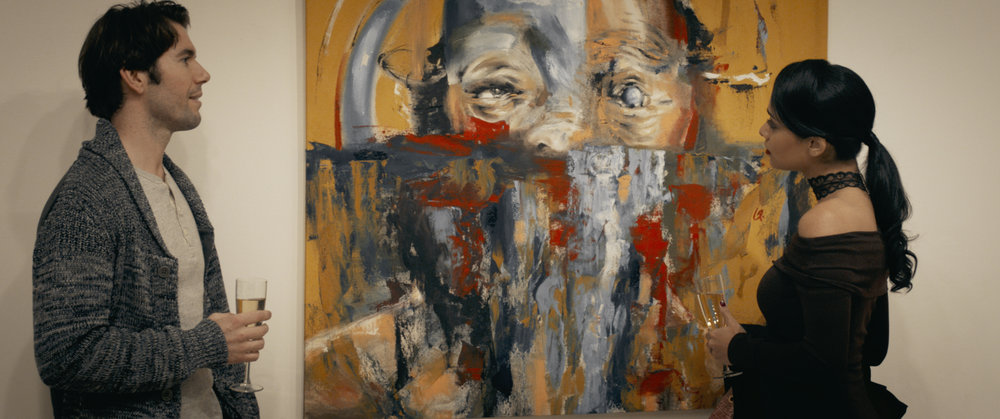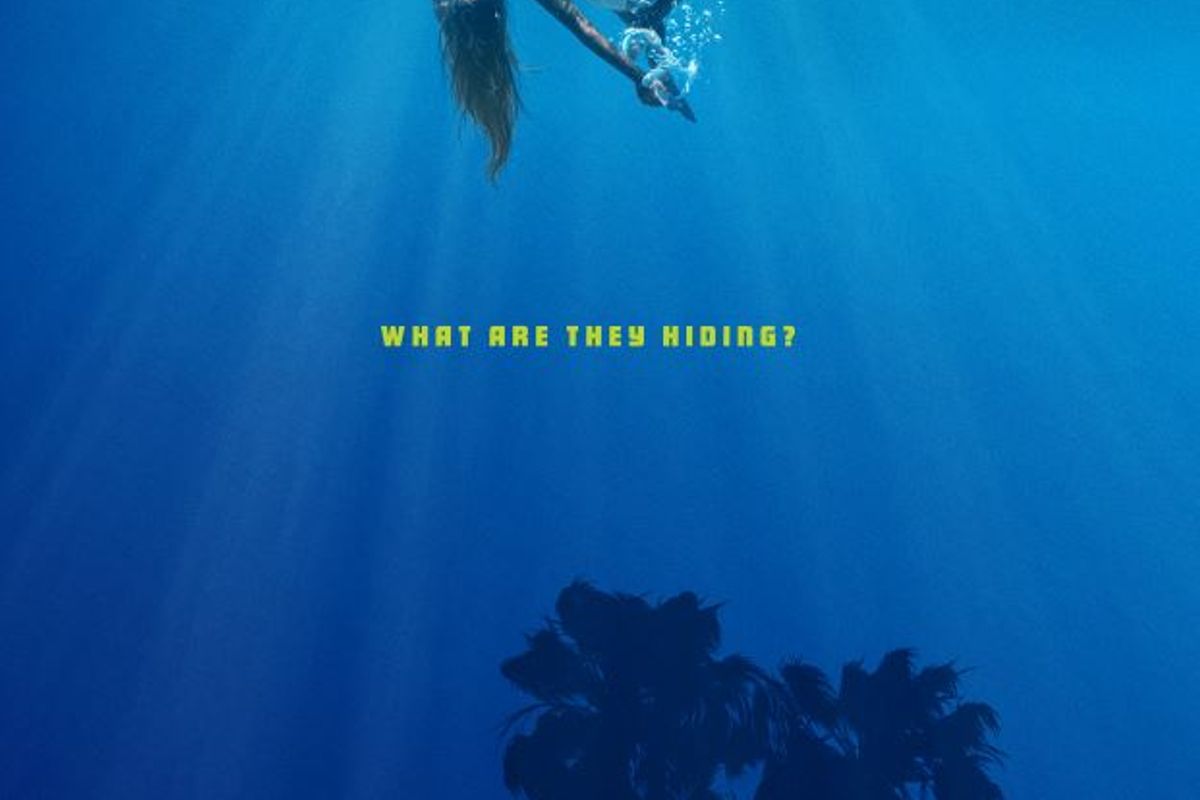With this piece, we have come to the end of the Decade Series of “Oh! The Horror….” This has been a fruitful endeavor in trying to place horror within a wider context and I, myself, have learned quite a bit in the process of researching and writing these pieces and, hopefully, you have as well. Because of this, be on the lookout for potential expansion of this series in the future here on Reel World Theology.
 The 2000s began in a space of technological paranoia and real-life terrorism and suffering in the form of Y2K and 9/11. Anyone of an age where impressions and memories could be made, could rattle off the how, where, and what of the events of September 11, 2001. It, like Pearl Harbor, made a deep mark on the soul and psyche of the US. While none of these acts happen within a vacuum, the death and destruction that was caused (and seen) stick to us and have continued to inform (and muddle) our foreign policy to this day. These fears set the tone of the decade and the film industry was just as deeply affected by them as anyone.
The 2000s began in a space of technological paranoia and real-life terrorism and suffering in the form of Y2K and 9/11. Anyone of an age where impressions and memories could be made, could rattle off the how, where, and what of the events of September 11, 2001. It, like Pearl Harbor, made a deep mark on the soul and psyche of the US. While none of these acts happen within a vacuum, the death and destruction that was caused (and seen) stick to us and have continued to inform (and muddle) our foreign policy to this day. These fears set the tone of the decade and the film industry was just as deeply affected by them as anyone.
War films and immediately-relevant films about US-Iraq relations notoriously suffered at the box office because, in the realm of 24-hour news cycles, seeing the reports from the frontlines of Afghanistan and Iraq was enough war for any person to witness. Why would we go to a movie to see more of it? Instead we saw an increasing American interest in films that the country had not shown much interest in before, like foreign cinema. The prominence of foreign cinema was becoming significant in the US in the 2000s with such directors as Ang Lee (Crouching Tiger, Hidden Dragon) and Roberto Benigni (Life Is Beautiful) and key films such as City of God, The Diving Bell and the Butterfly, Downfall, and The Lives of Others. Foreign cinema was also coming into prominence because of the progression of technology. The internet, social media, digital film, DVRs, among other elements opened the American population up to cultures beyond the Atlantic and Pacific waters. Accessibility of films through home video, and eventually streaming, allowed people not living in the cultural hubs of North America to experience stories that they would never see in the blockbuster-riddled landscape of American cinema, post-1990s.
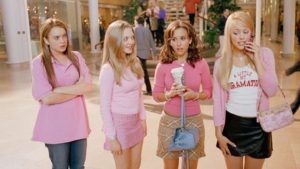 The studio system was becoming more and more varied by acquisitions of small indie companies which they would outsource the production of films. While the company names one saw on the screen were multiplying quickly, the audience wasn’t always aware that most of those smaller companies were in the pockets of six central studios: Time Warner, 20th Century Fox, Viacom, Sony, Walt Disney and NBC Universal. While the small number of companies is far from abnormal for the film industry, historically, it is the root system each company was building by purchasing film rights and independent film companies that was becoming the new normal. They were able to make more profit by diversifying their “stocks.”
The studio system was becoming more and more varied by acquisitions of small indie companies which they would outsource the production of films. While the company names one saw on the screen were multiplying quickly, the audience wasn’t always aware that most of those smaller companies were in the pockets of six central studios: Time Warner, 20th Century Fox, Viacom, Sony, Walt Disney and NBC Universal. While the small number of companies is far from abnormal for the film industry, historically, it is the root system each company was building by purchasing film rights and independent film companies that was becoming the new normal. They were able to make more profit by diversifying their “stocks.”
Documentaries gained more notoriety within an increasingly politically polarized country with the likes of Michael Moore’s Bowling for Columbine and Fahrenheit 9/11 and Al Gore’s An Inconvenient Truth. There were Republican responses like Fahrenhype 9/11 and In The Face of Evil. With each piece of rhetorical documentation, the country’s political and social fissures were beginning to become inflamed. Oh, and we learned that Americans love penguins with the success of The March of the Penguins which was delightful.
 The rise of “faith-based filmmaking” is a another feature of the 2000s that received a kickstart with Mel Gibson’s violent, foreign language film, The Passion of the Christ, in 2004. In some ways, this movement has felt like the last dying gasp of a certain breed of American Evangelicalism. These films are often marked by characters and storylines that lack little nuance in their presentation. They are triumphalistic and seldom show the reality of life as a religious person. There is conflict or persecution, but the climax of the story is basically this: if you let Jesus into your heart, your life will be better, your marriage will be better, your team will be better, you will win all of the arguments with your atheist compadres, and you will pursue holiness by your own performance. Their technical qualities are often outdone by Hallmark films. Rarely do they show Christians in the midst of turmoil and troubles after they have come to the faith. Fitting with the increasingly political rift, they largely veer towards the political Right when it comes to their makers and audience.
The rise of “faith-based filmmaking” is a another feature of the 2000s that received a kickstart with Mel Gibson’s violent, foreign language film, The Passion of the Christ, in 2004. In some ways, this movement has felt like the last dying gasp of a certain breed of American Evangelicalism. These films are often marked by characters and storylines that lack little nuance in their presentation. They are triumphalistic and seldom show the reality of life as a religious person. There is conflict or persecution, but the climax of the story is basically this: if you let Jesus into your heart, your life will be better, your marriage will be better, your team will be better, you will win all of the arguments with your atheist compadres, and you will pursue holiness by your own performance. Their technical qualities are often outdone by Hallmark films. Rarely do they show Christians in the midst of turmoil and troubles after they have come to the faith. Fitting with the increasingly political rift, they largely veer towards the political Right when it comes to their makers and audience.
In some senses, the 2000s could be seen as a cultural moment where the proverbial chicken is attempting to find the head that has been cut off. With 9/11 and the prolonged war in the Middle East, America as a nation was struggling with its own identity, yet doing it without confronting its own sins. The political and social rift that has only become worse since has its origins in our nation’s inability to confront its past and start remembering well, instead of conveniently. These internal struggles can be seen quite clearly in the makeup of cinema in the decade with its political rhetoric and shots across the bow.
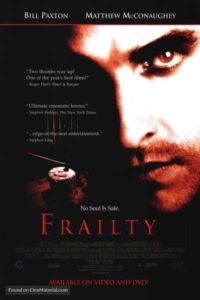 For the horror genre, specifically, the business of straight to video horror films was blowing up and decent profit margins were making these subpar quality (but not always bad) films a solid means of keeping the bottom line well into the black. Whereas the mainstream fare within horror cinema was following some of the same general film patterns. American remakes of Asian horror films were becoming rampant during the decade which introduced and translated (not always well!) foreign horror into American parlance.
For the horror genre, specifically, the business of straight to video horror films was blowing up and decent profit margins were making these subpar quality (but not always bad) films a solid means of keeping the bottom line well into the black. Whereas the mainstream fare within horror cinema was following some of the same general film patterns. American remakes of Asian horror films were becoming rampant during the decade which introduced and translated (not always well!) foreign horror into American parlance.
Perhaps the most fascinating aspect of horror in the 2000s, however, is the rise of torture porn. Films like those in the Saw, Hostel, and Final Destination series of films were finding a strange mix of exploitation by brutally murdering characters in gruesome, creative, and sadistic ways. While much could be said about the movement’s effect on horror as a whole, it seems important to recognize its presence in a post-9/11 world where films about war and the Middle East continually underperform. It could be said that these films are one way that the American psyche is working through how it deals with suffering and violence and evil that is becoming increasingly more brutal, witnessed through media, and detached from the individual person. Perhaps torture porn is the act of reckoning with America’s penchant for bloodlust and instead of ignoring it like our country has become so proficient at, we are forced to witness it in all of its moral ambiguity and harshness.
The difficulty about writing on this decade is the lack of distance we really have compared to the other decades I have covered. Who knows how many of these thoughts are valid and how many will shown to be shortsighted in the annals of history. Nonetheless, film will always, both, reflect and challenge the national conscience and horror will always dredge up the sewage running underneath.
“Sometimes truth defies reason, Agent Doyle.” — Fenton Meiks, Frailty
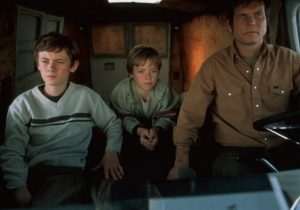 Bill Paxton’s directorial debut, Frailty, struck at a chord in the wake of September 11, 2001 as TV evangelists stated that the attacks on the World Trade Center were the judgment of God on this nation. Of course, they backed away from those statements when they began to lose followers as evangelists are often wont to do. However, the mindsets of the terrorists on that day is similar, logically, to those of the Christian evangelists in that they were doing the will of Allah, the God of Islam according to their interpretation of the Koran. The only difference between them and the evangelists is they acted on their principles whereas the evangelists gave in to their decreased audience. Yet the terrorists on that day, on some level, believed that America engendered infidelity to the laws of Allah and acted on it. Their truth trumped what most would consider a reasonable enjoinder.
Bill Paxton’s directorial debut, Frailty, struck at a chord in the wake of September 11, 2001 as TV evangelists stated that the attacks on the World Trade Center were the judgment of God on this nation. Of course, they backed away from those statements when they began to lose followers as evangelists are often wont to do. However, the mindsets of the terrorists on that day is similar, logically, to those of the Christian evangelists in that they were doing the will of Allah, the God of Islam according to their interpretation of the Koran. The only difference between them and the evangelists is they acted on their principles whereas the evangelists gave in to their decreased audience. Yet the terrorists on that day, on some level, believed that America engendered infidelity to the laws of Allah and acted on it. Their truth trumped what most would consider a reasonable enjoinder.
In this same way, we are brought into a story about a working class family of a father and two boys. Their father says he has received a revelation from God’s angels to be an instrument of wrath against demons in human form inhabiting the world. He enlists his sons to join him in his “holy” crusade. The youngest son states that he, too, received a vision and helps his father without much hesitation. The oldest son, however, sees this as psychosis as his father murders people who he says have done awful things shown to him when he touches them. Paxton’s direction, while not adventurous in its cinematography, is brilliant in how he frames the story and is able to build tension throughout its runtime. We are never sure if we are the subjects of an unreliable narrator or if what the father and youngest son see are actually real.
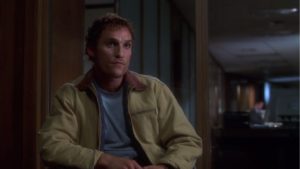 I have always seen the film in the light of the latter interpretation especially considering a scene shown in the last half of the film. The film’s power comes from the realization that these visions of demonic activity couldn’t be explained away by rational, materialistic explanations. That the world is, indeed, bigger than our own philosophies to paraphrase Hamlet, another tragic character. In the current climate of politics and society in the West, especially in America, it seems more and more important to recall the words of Digory Kirke in The Lion, The Witch, and The Wardrobe:
I have always seen the film in the light of the latter interpretation especially considering a scene shown in the last half of the film. The film’s power comes from the realization that these visions of demonic activity couldn’t be explained away by rational, materialistic explanations. That the world is, indeed, bigger than our own philosophies to paraphrase Hamlet, another tragic character. In the current climate of politics and society in the West, especially in America, it seems more and more important to recall the words of Digory Kirke in The Lion, The Witch, and The Wardrobe:
“There are only three possibilities. Either [Lucy] is telling lies, or she is mad, or she is telling the truth. You know she doesn’t tell lies and it is obvious that she is not mad. For the moment then and unless any further evidence turns up, we must assume that she is telling the truth.”
This quote sticks with me in the wasteland of a society that has embraced a cynical suspicion of others. Alt-right, conservative, moderates, liberals, progressives have their “other[s]” to give the side eye. The concept of trust in others–until they are shown to be untrustworthy–is pretty hard to find in all quarters these days. Yet, the dangerous side of Lewis’ suggestion is that there might be times when those who have shown to be utterly trustworthy speak something that we don’t want to be true. Frailty engenders a world where nothing we are shown prior to the father’s “revelation” would make one concerned for his mental health or his reliability. Yet he comes to his sons with a word from God that requires they kill people. And I think there is a strong case to be made that the film’s position is one that shows the father’s visions to hold true. Something to the discerning, logical mind would be seen as ridiculous or the result of mental illness. In a sense, the film holds to Meik’s line at the beginning: sometimes truth defies reason.
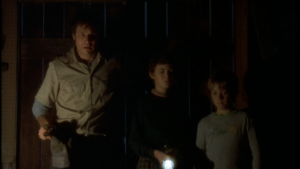 What is to be made of that message in a post-9/11 world? I am not sure there are any answers to that question that we would be comfortable following to their natural conclusions. Yet I think that is the power of Frailty. It subverts the very basis from which most of us work, including the religious, that anything that looks crazy is crazy and anything that doesn’t go with the flow of society and culture is wrongheaded. This is not to say that the father in Frailty was doing the actual work of God–plenty of Scripture would condemn his behavior–but the sheer audacity to have the film’s assumption be that the father’s visions are correct makes for a fascinating thought experiment within of models of suspicion in an increasingly suspicious society.
What is to be made of that message in a post-9/11 world? I am not sure there are any answers to that question that we would be comfortable following to their natural conclusions. Yet I think that is the power of Frailty. It subverts the very basis from which most of us work, including the religious, that anything that looks crazy is crazy and anything that doesn’t go with the flow of society and culture is wrongheaded. This is not to say that the father in Frailty was doing the actual work of God–plenty of Scripture would condemn his behavior–but the sheer audacity to have the film’s assumption be that the father’s visions are correct makes for a fascinating thought experiment within of models of suspicion in an increasingly suspicious society.
Not to mention the theological element that if God was in fact enlisting us to kill those who did evil deeds–”demons” which may be the film’s one categorical flaw since the visions encompassed human behaviors that happen to this day–we would all eventually come up dead according to the Scriptures. The Law is unforgiving, thankfully the Lord isn’t.
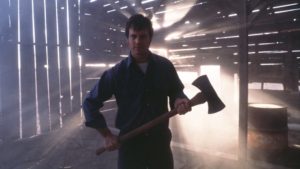 This is the perfect film to look at within the scope of 2000s horror because it makes us question whether God speaks into the world and how that looks to those on the outside, those who have to choose to trust those who claim His revelation. Those Muslim men had to believe that Allah called them to enact jihad upon America. They believed it to be true against all reason. Just like those who bomb abortion clinics or dole out poisonous kool-aid to cult adherents. We don’t know how to interact with such certainty and faith in our world, let alone how to discern the propositions of the multiplicity of belief systems that exist in this world. However, doubt within a culture of trust can be beneficial, but that means that we start from a place of taking the beliefs of people seriously and respecting their humanity until they are shown to be unreliable. We are told to love even unto death, forsaking all fear. Frailty shows that task to be harder and more revolutionary than any other act we will ever do.
This is the perfect film to look at within the scope of 2000s horror because it makes us question whether God speaks into the world and how that looks to those on the outside, those who have to choose to trust those who claim His revelation. Those Muslim men had to believe that Allah called them to enact jihad upon America. They believed it to be true against all reason. Just like those who bomb abortion clinics or dole out poisonous kool-aid to cult adherents. We don’t know how to interact with such certainty and faith in our world, let alone how to discern the propositions of the multiplicity of belief systems that exist in this world. However, doubt within a culture of trust can be beneficial, but that means that we start from a place of taking the beliefs of people seriously and respecting their humanity until they are shown to be unreliable. We are told to love even unto death, forsaking all fear. Frailty shows that task to be harder and more revolutionary than any other act we will ever do.

